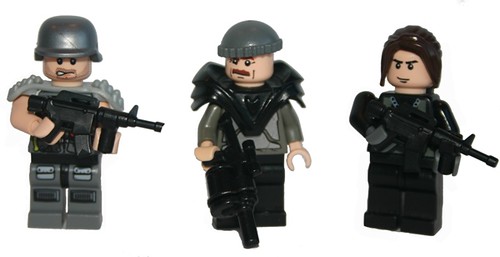Swedish Lego Soldiers Posted by Marcus Cederström on Jan 25, 2016 in Swedish Language, Vocabulary
Lego was founded in 1932 in Billund, Denmark. The name of the company is a portmanteau combining the Danish words leg (play) and godt (well). Play well. Lego. Cute, right? But the word lego has existed in Swedish for quite some time, albeit in a much more sinister context. Legosoldat is the Swedish word for mercenary.
This is one of those words that I associate with tiny little Lego people that I played with as a child. They were easy to buy at the store, just like a mercenary—a legosoldat—would be easy to buy, if that was a thing you were into. That’s a false etymology and has nothing to do with the word at all. Not even close.

I have stepped on so many of these poor little Lego soldiers in my life. “USDF soldiers” by Brian Rinker – Own work. Licensed under CC BY 2.0 via Flickr.
After a little digging and an incredible (and short) article by Institutet för språk och folkminnen, which has some super interesting Swedish articles about language and folklore, it turns out that the word legosoldat has been around since the 1800s and that legoknekt (knekt being another word for solider) has been around since the 1600s. The word lego has been around in Swedish since the 1500s. At least. So for those of you scoring at home, the Swedes were using the word lego about 400 years before those colorful building blocks were getting stuck to your feet.
This is where the historical linguists come in. Lego comes from the noun lega in Old Swedish. Essentially it means something that could be rented out. So legosoldat = soldier that can be rented out = mercenary. There are a few other words that you might see in Swedish that use lego as a prefix, for example:
Legoarbete = contract work
Legoavtal = rental contract (a judicial term)
Legokörning = contract delivery
Legostadga = historical term about the law regulating the relationship between employers (usually landowning farmers) and their employees
Legotillverkning = contract manufacturing
Legotrupp = mercenary. Again. There are quite a few words for mercenary in Swedish.
So there you go. When you see the word lego tacked on to the beginning of a word in Swedish, chances are it has nothing to do with the toys.
Interested in practicing your Swedish by learning more about the etymology of legosoldat? Check it out Vad är det för lego i legosoldat.

Build vocabulary, practice pronunciation, and more with Transparent Language Online. Available anytime, anywhere, on any device.




Comments:
JP:
In the context you could’ve mentioned the verb leja which according to SAOB means “mot överenskommen ersättning till ägaren betinga sig nyttjanderätten för viss tid till (ngt), arrendera” or “gm avtal om ersättning betinga sig nyttjanderätten till (ngns) arbetskraft, överenskomma med (ngn) att mot ersättning ställa sin arbetskraft till förfogande; anställa (ngn) i sin tjänst, engagera (ngn)”.
Marcus Cederström:
@JP A great addition!